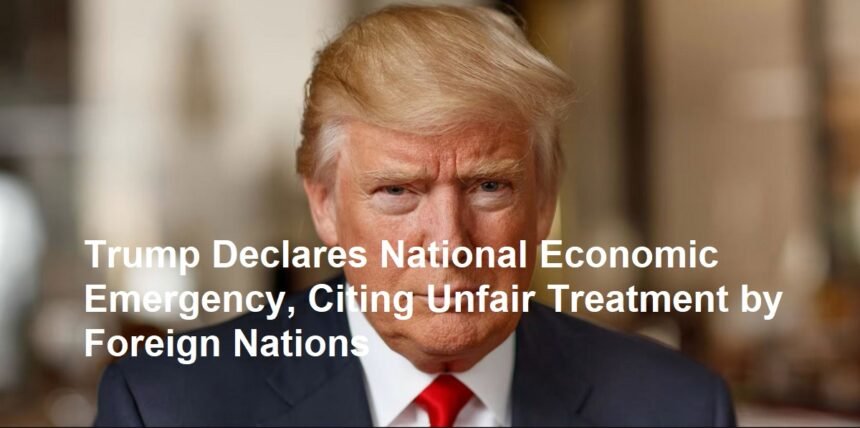On April 3, 2025, President Donald Trump officially declared a national economic emergency in a bold move aimed at addressing what he described as decades of unfair treatment by foreign nations. The announcement, delivered during a nationally televised address from the White House, marked a dramatic escalation in the administration’s efforts to overhaul U.S. trade and economic policies.
In his address, President Trump claimed that America had long been exploited by other countries through unfair trade practices, predatory tariffs, and unfavorable economic agreements. “For too long, our country has been taken advantage of by nations that do not play by the rules,” Trump stated. “Today, we are putting an end to this abuse and reclaiming the economic prosperity that has defined our nation.” He argued that these perceived injustices had weakened the United States’ economy, undermined domestic industries, and led to significant job losses.
The declaration of a national economic emergency provides the President with additional executive powers to implement sweeping changes to trade policies, tariffs, and other economic measures without the delays typically associated with congressional approval. This step is expected to lead to immediate reassessments of current trade agreements and could prompt the imposition of further tariffs or sanctions against countries deemed responsible for harming U.S. economic interests.
Economic analysts and political commentators have been quick to react to the announcement. Some view the decision as a necessary measure to protect American jobs and industries that have suffered under what they see as imbalanced global trade practices. “The administration’s move reflects a growing frustration with the status quo,” said one trade expert. “Many believe that stronger measures are needed to correct decades of policies that have left the U.S. at a disadvantage.” However, critics warn that the declaration could lead to increased market volatility and spark retaliatory actions from trade partners, potentially igniting a broader trade war.
The emergency declaration comes at a time when the U.S. economy is already facing headwinds from various global challenges, including supply chain disruptions, rising energy costs, and a sluggish post-pandemic recovery in some sectors. The President’s speech stressed that the national economic emergency was not merely a response to current market conditions but was aimed at correcting systemic issues that have been festering for years. “We are not just reacting to today’s problems,” Trump emphasized. “We are taking a stand against a system that has consistently undervalued our contributions and exploited our resources.”
In addition to the economic implications, the President’s announcement has significant geopolitical ramifications. Trump’s administration is expected to reassess longstanding alliances and trade agreements, potentially reconfiguring America’s role in the global economic landscape. In his address, the President criticized several key allies and trading partners for their policies, suggesting that many of them had benefited at the expense of the United States. “Our allies must now understand that the era of one-sided deals is over,” he declared. “America will no longer be the sucker in this global marketplace.”
The White House has indicated that over the coming weeks, a series of new policies will be unveiled to support the emergency declaration. These measures are anticipated to include adjustments to tariff structures, increased incentives for domestic manufacturing, and potential renegotiations of international trade agreements. The administration is also expected to engage in diplomatic efforts aimed at convincing other nations to adopt more equitable trading practices, though experts caution that such efforts may face significant resistance.
As the nation absorbs the news, reactions remain mixed. Business leaders and industry groups are watching closely, weighing the potential benefits of increased protection for domestic industries against the risks of escalating trade tensions. Meanwhile, global financial markets have already begun to exhibit signs of nervousness, with investors bracing for further uncertainty in the coming months.
President Trump’s declaration of a national economic emergency represents a turning point in U.S. economic policy, one that underscores the administration’s commitment to radically reshaping America’s trade relationships. Whether this bold strategy will succeed in reversing decades of perceived economic exploitation remains to be seen, but for now, the message is clear: the United States is ready to fight back against what it views as an unfair global system.












